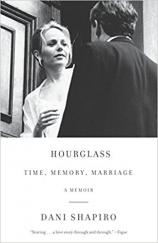Hourglass: Time, Memory, Marriage
Review
Hourglass: Time, Memory, Marriage
Roughly once a month on her website, Dani Shapiro shares a post of a few hundred words, commenting on some aspect of her life or work as a writer of both fiction and memoir. Elegant, revealing and wise, these insights never fail to leave me with the feeling I've had the privilege of sharing a few precious moments with a friend who is as compassionate as she is intelligent. I had that same feeling as I read HOURGLASS, Shapiro's gorgeous brief memoir of her marriage to screenwriter and director Michael Maren.
As someone who has been married for 41 years, I come to the subject with a modest claim to authority, at least as it applies to the single couple I know best. And while I wouldn't presume to share any secrets for a long and happy marriage, I will say that Shapiro perfectly captures the mixture of discovery, compromise, error, joy, misunderstanding and sheer luck that are the stuff of any enduring relationship.
HOURGLASS lacks any of the three "As" --- adultery, addiction or abuse --- that draw many readers to the memoir genre. Instead, it's an episodic account of the Shapiro-Maren union, as seen from the vantage point of nearly 18 years. From there, the book circles back to the couple's French honeymoon in June 1997 (recounted in fragments from Shapiro's journal) and forward through some of the highs and lows of their years together.
"...[a] gorgeous brief memoir of [Shapiro's] marriage to screenwriter and director Michael Maren.... [HOURGLASS is] a rewarding portrait of the mysterious bonds that hold woman and man together."
As Shapiro describes it, there was little reason to be optimistic that her marriage to Maren (identified only as "M." in the book) would last. A history that included two previous marriages, one as a teenager and only the second of which she revealed to Maren before they wed, hardly made her a sterling candidate for a stable union at age 35.
Before turning to his current career --- one that so far has produced a single movie and an assortment of promising projects often culminating in dead ends --- the previously unmarried Maren, then 41, worked as an aid worker and journalist in hot spots like Somalia and never fully lost his zest for the cocktail of danger and excitement those assignments offered. He and Shapiro met by happenstance at a New York literary party, and their mutual attraction was instantaneous, but she recognizes the string of contingencies, "the odds that the whole thing could have been a near miss," that might have turned their lives away from each other.
As Shapiro writes this memoir, and when she and Maren aren't working on a play they're creating for a pharmaceutical company program on Alzheimer's disease (Maren's mother is a victim), he scans family photographs and videos, and emails them to her. The memoir itself creates the impression of someone paging thoughtfully through a box of cherished family albums: "Change even one moment and the whole thing unravels," she observes. "The narrative thread doesn't stretch in a line from end to end, but rather, spools and unspools, loops around and returns again and again to the same spot." Employing that structure, Shapiro economically relates the moments both mundane (a woodpecker that defies Maren's efforts to dispatch it) and terrifying (their son's rare childhood seizure disorder) that define their life together.
Shapiro also reveals her passion for collecting quotations in what have come to be known as commonplace books. She makes judicious, but effective, use of these gleanings, citing sources as diverse as Joan Didion and Ludwig Wittgenstein and poets like Wendell Berry and Wislawa Szymborska to both validate and enlarge her thoughts. Her own prose, in one finely chiseled sentence after another, glitters with a gemlike precision, reflecting an attention to craft that's always been a touchstone of her work.
For all the recognition her graceful work has earned her, Shapiro and Maren have had to contend daily with the daunting economics of the writing life. It's a subject she addressed briefly in her excellent book of instruction, STILL WRITING. Like marriage itself, it's something of a high-wire act. "It turns out that two writers being married to each other is perhaps not the most practical way of going through life," she writes.
And so, despite what appears to be an idyllic life in the Connecticut countryside, where they've resided with their son Jacob since 2002, and teaching assignments in places like Aspen or the writers conference she and Maren created in Positano, "We have no savings, no retirement plan. Some months we are barely able to pay our bills and triage them until the next check comes in."
That same sense of uncertainty hovers over their marriage, despite the bedrock love that grounds it. Shapiro offers no grand pronouncements derived from her and Maren's success in avoiding the shoals on which many marriages founder. Instead, her candor in describing the arc of their relationship is refreshing: "In a life made up of fortune and its flip side, M. and I have never had a plan. We've made it up as we've gone along, and for the most part, we've made it work."
Perhaps it's that humility, a recognition of the patient, day-by-day effort that's necessary to till the ground in which the seeds of marriage can flourish, that makes HOURGLASS such a rewarding portrait of the mysterious bonds that hold woman and man together.
Reviewed by Harvey Freedenberg on April 14, 2017
Hourglass: Time, Memory, Marriage
- Publication Date: April 3, 2018
- Genres: Memoir, Nonfiction
- Paperback: 160 pages
- Publisher: Anchor
- ISBN-10: 1101974265
- ISBN-13: 9781101974261





